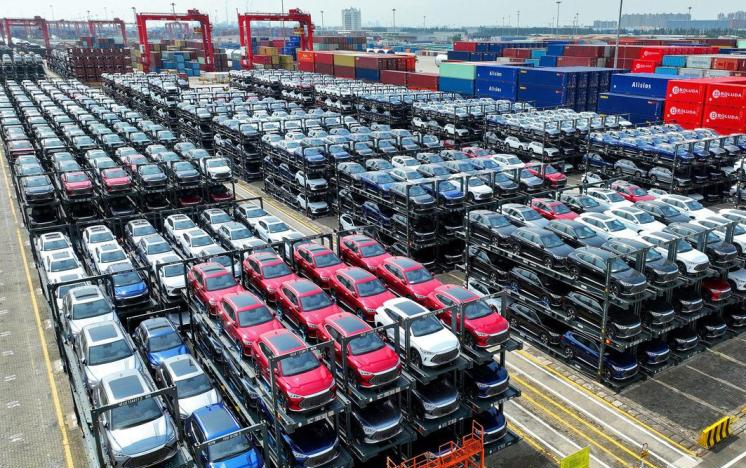
In the first seven months of this year, seven of the top 10 registered electric vehicle models in Malaysia came from China, including three from BYD, Great Wall Euler, MG MG4, Chery Omoda and smart. Next, Chinese new power brands such as polar Krypton and Xiaopeng will be listed in Malaysia one after another. In fact, not only Malaysia, but also these Chinese new energy vehicles have poured into the Southeast Asian market. On the one hand, these Chinese brands bring opportunities to the Southeast Asian market, on the other hand, they also cause fierce competition and challenges.
In recent years, Southeast Asian countries such as Malaysia, Indonesia, Thailand and Singapore have actively promoted emission reduction and promoted the rapid popularization of electric vehicles. Byd Seal is Malaysia's electric vehicle sales champion in the first half of this year, registered 1,764 units, more than the Tesla Model Y's 1,747 units. Byd was also the best-selling electric car in Singapore last year, registering 1,416 units; Tesla came in second with 940 registered vehicles. In Indonesia, Chinese electric vehicles account for about 80 per cent of the market, with the top-selling brands including Wuling, BYD, Chery and Hechuang.
Siwage Dharma Negara, a senior researcher at the Institute of Southeast Asian Studies in Yusof Issa, Singapore, told Lianhe Zaobao that consumer acceptance of Chinese electric vehicle brands depends on a number of factors, including brand recognition, product quality and pricing.
"Some Chinese brands have achieved good development and reputation in the market, such as BYD, NIO and MG, which has enhanced consumer recognition of Chinese electric vehicles." In addition, consumers in Southeast Asia are quite price sensitive. "Compared with brands from other countries, Chinese electric cars are a more affordable option."
On the other hand, thanks to favorable government policies and increasingly perfect charging facilities, the demand for electric vehicles in Southeast Asia is also growing.
Sivagh said growing demand for electric vehicles in Southeast Asia is the main reason for attracting Chinese brands. In addition, ASEAN's friendly trade relations with China and a relatively relaxed regulatory environment help Chinese electric vehicles to remain competitive in the Southeast Asian market.
Chinese electric vehicles currently face great market barriers in the European and American markets. In early October, the European Union imposed tariffs of up to 45.3 percent on imported Chinese electric vehicles, and the United States and Canada had earlier imposed 100 percent tariffs.
The analysis believes that the punitive tariff policy of Europe and the United States will further promote China's electric vehicles to Southeast Asia. In addition, Chinese brands can also take advantage of tariff concessions among ASEAN member countries to expand exports to neighboring countries.
Professor Huang Jinrong of the Department of Economics of Malaysia Raman University pointed out in an interview that the electric vehicle market in Europe, the United States and China is almost saturated at this stage, and consumer enthusiasm has begun to fade. "Southeast Asia is a latecomer in the electric vehicle consumer market, so there is great potential. This is the main reason why Chinese brands are entering Southeast Asia on a large scale."
China's electric car influx has more advantages than disadvantages, says scholar
Chinese electric vehicles compete with European, American and Japanese brands in the Southeast Asian market, but Southeast Asian countries are also worried that the influx of Chinese brands could impact the local auto industry, especially the nascent electric vehicle industry.
Southeast Asian countries are actively developing the electric vehicle industry. Among them, Proton launched the first domestic electric vehicle; Singapore has Hyundai Motor's electric vehicle production line; Indonesia is using its rich nickel resources to attract investment in battery manufacturing and guide manufacturers to set up local plants to assemble electric vehicles. Thailand hopes to use the existing traditional automobile industry base to attract electric vehicle manufacturers to invest in order to achieve the transformation and upgrading of the automobile manufacturing industry.
With its mature supply chain, technological advantages and cost-effectiveness, Chinese electric vehicles are likely to quickly take market share in Southeast Asia, putting pressure on the region's nascent electric vehicle industry. In addition, some worry that China's overcapacity in electric vehicles will be dumped in Southeast Asia.
Huang Jingrong believes that most Southeast Asian countries are not big car production countries, so it is expected that China's electric car into the Southeast Asian market will have a limited impact on the regional auto industry.
"Of the Southeast Asian countries, only Malaysia has its own car brand, but it is not the main industry, so even if the influx of Chinese electric vehicles, the local car manufacturing industry will not be significantly affected." In the short to medium term, there will be more choices and consumers will be able to buy electric vehicles at a lower price."
Siwag believes that cooperation between Southeast Asian companies and Chinese brands in areas such as manufacturing and research and development, battery production, infrastructure construction and manpower training will help strengthen the electric vehicle ecosystem in the region.
"The strategic cooperation between the two parties will not only promote Southeast Asia's transition to sustainable transportation, but also gain access to Chinese technology and investment." Indonesia is a typical example, as one of the world's largest producers of nickel ore, Indonesia has attracted a lot of investment from Chinese companies, including Ningde Times, Wuling and BYD, to build nickel battery factories."
Malaysia and Chinese companies cooperate to launch domestic electric vehicles
Malaysia's Proton has also partnered with China's Geely Automobile to launch its first domestically produced electric vehicle, the e.MAS 7.
He said Southeast Asian countries are committed to achieving the goal of zero emissions and promoting the development of green energy industries. "Cooperation with Chinese brands will not only attract more investment, but also promote technology transfer and enhance the competitiveness of the local electric vehicle industry."
Currently, the Malaysian government does not allow foreign electric vehicles priced below RM100,000 to be sold in the country to protect the domestic car market. However, in order to attract foreign investment, any electric vehicle assembled in Malaysia is not subject to the minimum price.
Siwag believes that Southeast Asian countries will respond to the influx of Chinese electric vehicles with a variety of strategies, in order to cultivate local industry, but also access to advanced technology.
"Proton entered into a strategic partnership with Geely to produce its first electric vehicle. This collaboration is expected to be further developed to accelerate the production of electric vehicles in Malaysia."

As 2026 approaches, the space sector is once again entering the public spotlight, becoming part of everyday discussion.
As 2026 approaches, the space sector is once again entering…
Microsoft CEO Satya Nadella recently launched a personal bl…
In the early hours of January 3, 2026, flames in the Caribb…
As 2026 begins, the euro area economy remains mired in a "w…
According to Xinhua News Agency, the Ministry of Agricultur…
Recently, the United States launched a military raid on Ven…